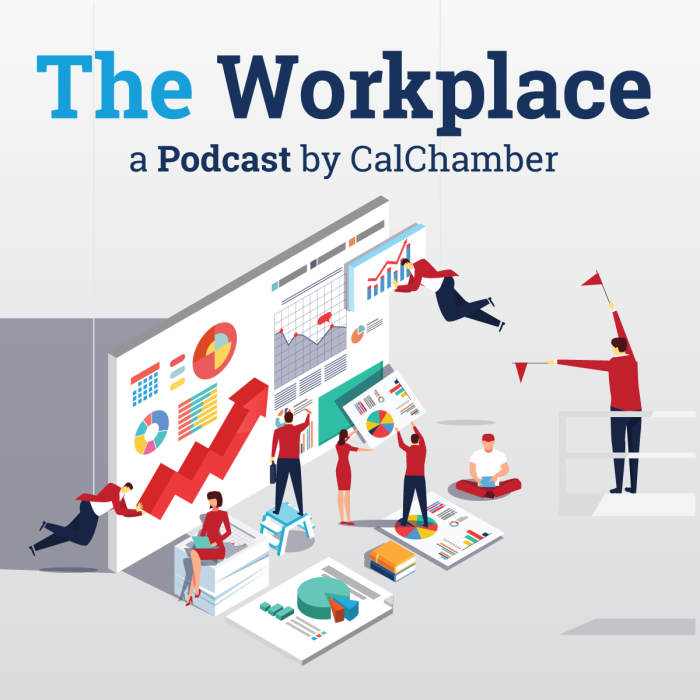
In Episode 150 of The Workplace podcast, CalChamber employment law expert Matthew Roberts and CalChamber policy advocate Ashley Hoffman discuss SB 1044 (Durazo; D-Los Angeles), a proposal that would allow employees to leave work or refuse to show up to work if the employee subjectively feels unsafe.
SB 1044 Amendments
We’ve previously explored SB 1044 on The Workplace podcast, but as the bill makes its way through the legislative process, amendments have been made to the proposal and significant ambiguities still remain that make it untenable for employers in its current form, Roberts says at the start of the podcast.
SB 1044 is a CalChamber job killer bill. The proposal allows workers to access their cell phones or other communication devices, or to simply leave the worksite altogether, without any repercussions from their employer, as long as they inform their employers that they feel unsafe at work due to a state of emergency or other emergency conditions, Roberts explains.
In a recent committee, amendments were made so that the bill applies only to some emergency or emergency conditions after the bill’s enactment, Hoffman says. So, for example, the law wouldn’t apply to the current COVID-19 state of emergency.
The bill now also requires the employee to provide the employer with notice where possible. And finally, the bill’s definition of state of emergency has been narrowed so that it no longer applies where the state of emergency is technically still in place, but the emergency conditions have ceased.
Roberts points out that there’s two phrases being used: state of emergency, which is when the governor comes out and announces a state of emergency; and emergency condition. But what exactly is an emergency condition, he asks Hoffman?
Hoffman clarifies that the bill’s author envisions an “emergency condition” as something that is imminent, such as an imminent threat to the structure, or health and safety of the employee. For example, an emergency condition would include an evacuation, or if you have a child at school and there’s a fire in a structure next to the school.
Employer Concerns
There are two pieces of SB 1044 that the CalChamber is concerned about, Hoffman says. The first concern is what is really “imminent and ongoing,” and who gets to decide what it is? The bill is very subjective to the worker and this phrase can be interpreted quite broadly.
For example, she says, if there is a fire that is relatively under control and the worker is not under immediate threat, but the air quality index (AQI) is higher than the worker is comfortable with, then the worker could refuse to work.
The second biggest issue is that there is no carve-out for emergency personnel or anyone who aids emergency personnel. There are a number of positions where a person’s job is to aid in an emergency or aid in some sort of crisis. Those positions can include firefighters, police and health care workers. So if there’s a gas leak, who’s going to be able to come in, clean up and make sure that the damage is being mitigated?
“It’s very important that those people are reporting to work,” Hoffman says.
Doesn’t Give Employers Flexibility to Respond
What recourse does an employer have, Roberts asks, if an employee leaves because they feel unsafe? What are an employer’s choices?
If an employer disputes the matter, they risk litigation, Hoffman replies. The worker can say that the employer violated the law and it would fall under the Labor Code and be subject to the Private Attorneys General Act (PAGA).
If an employer replaces the worker, that could be construed as an adverse action or retaliation. So, the bill gives the employer absolutely no flexibility to be able to respond to the situation if they are short on workers, Hoffman says.
Economic Impact, Unintended Consequences
A recent economic analysis estimates that more than 20,000 jobs will likely be lost as a result of SB 1044. The state would also lose an estimated $117 million in state taxes. The industries that will be particularly hard hit are health care, social assistance, food services, and scientific and technical services, Hoffman says.
Roberts replies that we should highlight some of these key industries.
“If there’s people who are injured in the area, and the hospitals have to take in patients…and the whole expectation from the public is that someone will be there to care for us — there’s nothing in this bill that prevents nurses and doctors from just walking off, right?” Roberts asks Hoffman.
Correct, she says. Nothing in the bill exempts them.
Bill Status
SB 1044 is presently on the suspense file in the Senate Appropriations Committee, Hoffman tells listeners. This means the fiscal impacts to the state exceed a certain amount and so the Appropriations Committee has put a hold on it until about the end of May, when the committee will decide whether the bill should move forward or move forward with amendments.
Although the bill is on hold until the end of May, people concerned about the bill should reach out to their legislator now, she said.

